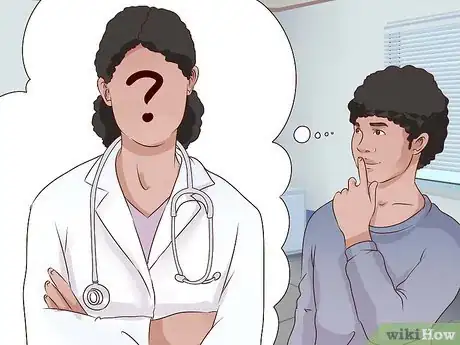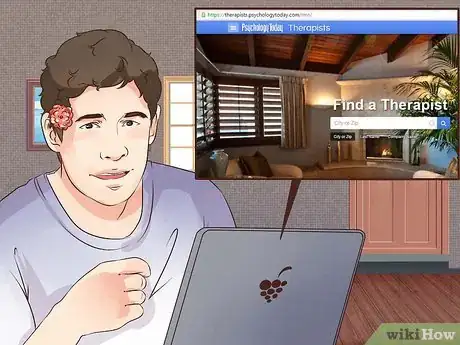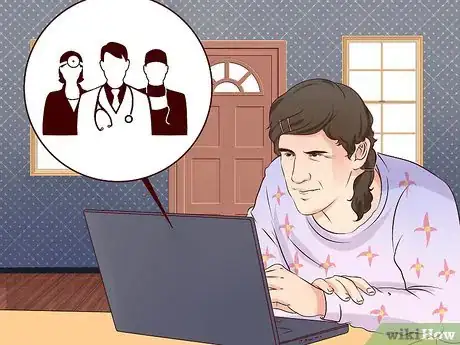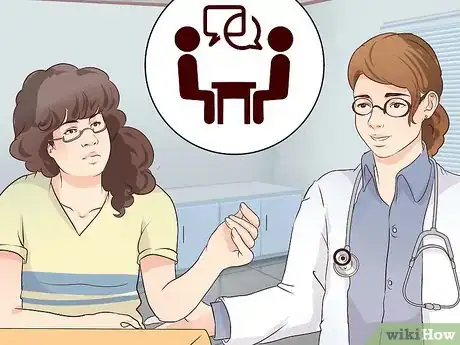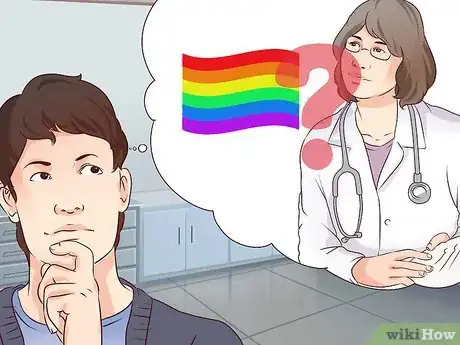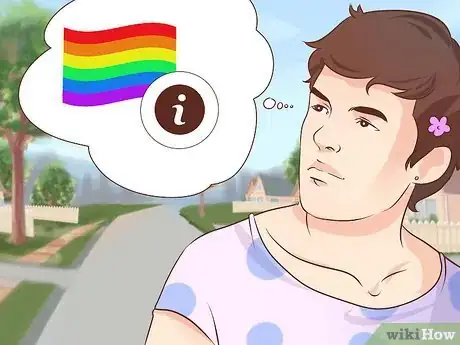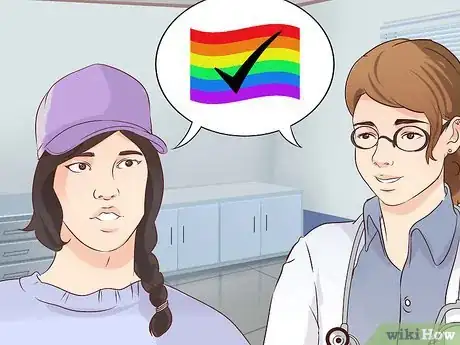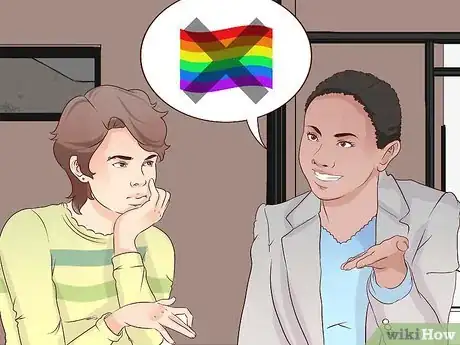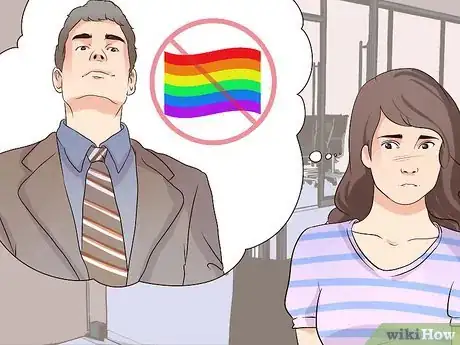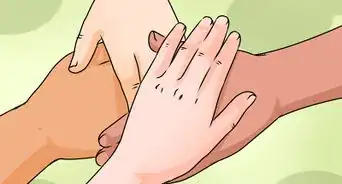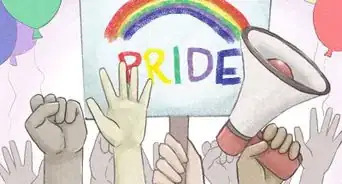This article was co-authored by Inge Hansen, PsyD. Dr. Inge Hansen, PsyD, is the Director of Well-Being at Stanford University and the Weiland Health Initiative. Dr. Hansen has professional interests in social justice and gender and sexual diversity. She earned her PsyD from the California School of Professional Psychology with specialized training in the area of gender and sexual identity. She is the co-author of The Ethical Sellout: Maintaining Your Integrity in the Age of Compromise.
This article has been viewed 72,497 times.
Even if you've had a bad experience in the past, there are a lot of therapists out there who will be very supportive of you as a member of the LGBT+ community. We'll help you work through some of your options so you can find the mental health provider who's the best fit for you.
Steps
Finding a Therapist
-
1Find a therapist who specializes in or has experience with LGBT issues and possesses an affirming and sympathetic attitude. Make sure to specifically seek out therapists that list themselves as "LGBT-affirming." After all, you want a therapist who will affirm your LGBT identity and help you reach a better place mentally while being who you are.
- Consider referrals from friends in your community.
- Look at the Yellow Pages.
- See if there is a LGBT community center or support groups that might point you in the right direction.
-
2Consult internet resources to locate an LGBT-affirming therapist. There are many places on the internet to find a list of mental health professionals that can help you, including professional association websites, forums, support group websites and more. Consider the following:
- Search for mental health professionals at https://therapists.psychologytoday.com/rms
- Use the Gay and Lesbian Medical Association’s Provider Directory athttp://www.glma.org/ to look through a list of inclusive medical providers.
- Check out the Healthcare Equality Index at http://www.hrc.org/campaigns/healthcare-equality-index to find the LGBT inclusive policies of organization leaders in healthcare.
EXPERT TIPDr. Inge Hansen, PsyD, is the Director of Well-Being at Stanford University and the Weiland Health Initiative. Dr. Hansen has professional interests in social justice and gender and sexual diversity. She earned her PsyD from the California School of Professional Psychology with specialized training in the area of gender and sexual identity. She is the co-author of The Ethical Sellout: Maintaining Your Integrity in the Age of Compromise.Clinical Psychologist
 Inge Hansen, PsyD
Inge Hansen, PsyD
Clinical PsychologistOur Expert Agrees: You can often find therapists who are LGBTQ+ affirmative by checking national and local groups focused on LGBTQ+ therapy. Also, look at the specialties of each therapist to see if they list areas related to gender and sexuality. From there, it can be very helpful to have a phone conversation to ask direct questions about a therapist's experience and background before you start working with them.
Advertisement -
3Look for a distance therapy option. LGBT sympathetic therapists are not available everywhere. However, distance therapy is a possible way to get the therapy you desire. Some therapists offer different forms of distance therapy in an effort to reach a wider range of people in various locations and across distances. Phone therapy and online therapy are effective means to engage a LGBT-affirming therapist from outside of your community.[1]
-
4Research alternative ways to get your therapy. Don’t limit yourself to just “therapists.” There are a wide range of mental health, and social welfare professionals who might be able to provide the guidance and support you need. Consider the following:
- Licensed Clinical Social Workers: These social workers have clinical experience. You'll often find them working in group settings.
- Licensed Addiction Counselors: Addiction counselors are not therapists, but work in a similar capacity.
- Licensed Marriage and Family Therapists: These therapists specialize in family and marriage issues.[2]
Selecting Your Therapist
-
1Interview prospective therapists before you commit. Now that you’ve located a few therapists, it’s time to contact and interview them. You can do this through an initial consultation, but it might be better and more cost effective to vet your therapist through a very short phone call in which you ask a few questions.
- Ask them if they have any LGBT friends or family.
- Ask them if they are up to date on the latest scholarly work in their field on LGBT issues.
- Ask them if they've worked with other LGBT people.
- Ask them if they are comfortable talking about LGBT issues and if their personal or religious feelings might get in the way.
- Above all, ask them to be as open an honest with you, as you will be with them.
-
2Visit your therapist. After you’ve interviewed your therapist, you need to schedule an appointment in order to have more time to evaluate them and your comfort level with them. If you don’t feel comfortable, and the therapist did not address all of your concerns and seem sympathetic, then you should go else where. After your initial visit, consider the following:
- Did this person seem at ease with you?
- Did they talk openly about your sexuality or gender identity?
- Did you feel comfortable?
-
3Gauge your therapist’s perspective and their intentions. Your therapist should not reinforce negative messages prevalent in society about LGBT people. They should suggest positive coping strategies to deal with the discrimination you experience. Positive coping strategies can include:
- Setting boundaries with harmful people in your life.
- Joining an LGBT group.
- Finding volunteer work in the community.
EXPERT TIPDr. Inge Hansen, PsyD, is the Director of Well-Being at Stanford University and the Weiland Health Initiative. Dr. Hansen has professional interests in social justice and gender and sexual diversity. She earned her PsyD from the California School of Professional Psychology with specialized training in the area of gender and sexual identity. She is the co-author of The Ethical Sellout: Maintaining Your Integrity in the Age of Compromise.Clinical Psychologist
 Inge Hansen, PsyD
Inge Hansen, PsyD
Clinical PsychologistMake sure the therapist makes you feel comfortable and supported. Be aware that just because a therapist is affirming in one area, it doesn't mean they will be affirming in all areas. For instance, they may be very open to gay identities but struggle with trans or non-binary identities.
-
4Commit to the process of therapy. Now that you’ve researched, interviewed, and chosen your therapist and decided you are comfortable with that person, you should commit to a course of therapy. Working through your issues, whatever they might be, will probably not be a quick or easy process. Therapy is often an ongoing process and it might take months or even years to begin to work through your problems. As long as you are in a positive and affirming relationship with your therapist and you feel it is helping you heal and grow, you should stick with the process!
Avoiding Bad Matches
-
1Educate yourself on the current views of LGBT issues in the psychological community. There have been many positive changes since the days when not being heterosexual was viewed as a disease. However, other areas like gender identity are unfortunately sometimes still viewed through a pathological lens. Some of the main points to remember are:
- Being LGBT is not an illness, and those who say it is are in disagreement with the findings of the American Psychological Association, the American Psychiatric Association, and the American Medical Association.
- No science has backed up theories that being LGBT results from having parent problems during childhood. Therapists who still advocate that view are not only on dubious scientific footing, but are reinforcing the negative messages about being LGBT.
- Attempts to change someone's sexual orientation or gender identity are ineffective and harmful.
- Being LGBT in and of itself has not been found to be a source of mental illness or to result in rates of mental illness higher than the general population. Instead, stresses an individual faces from homophobia cause a great deal of mental anguish for LGBT people. Therapies that ignore this can increase rates of suicide, anxiety, and depression in the those being treated.[3]
-
2Looks for a therapist who shares your values. Counselors who advertise as working within a certain religious structure are outwardly advertising that they will be using this as their value scaffolding in their therapy. This is not to say you cannot find a therapist who is both religious and LBGT-affirming, nor is it to say you can't be of a certain religion and also be LGBT. Talk to a potential therapist about their beliefs and values, and whether or not they have a moral stance on LBGT issues. If they are not supportive, then this is not the counselor for you. Do not allow anyone to try to change you to conform to their own religious morality.
-
3Identify the terminology and techniques used by illegitimate, gay-conversion therapists. There are many therapists, religious and non-religious, who specialize in making you “normal” and turning you heterosexual. Be aware of their tactics and their terminologies so you can identify them. If your therapist does use any of these tactics or terminologies, you should probably go elsewhere. To help identify gay-conversion therapists, consider these questions:
- Does the therapist insist you're a "confused heterosexual" and not respect your gender or sexual identity?
- Does the therapist spend a lot of time talking about how your parents treated you when you were very young?
- Does the therapist ignore your mental health concerns and insist you engage in gender “appropriate” activities?
- Does the therapist reject the idea that it's okay to be LGBT?
-
4Look for signs that a therapist might not be sympathetic. When looking for a therapist, you need to be aware that not all therapists will be open and sympathetic to LGBT issues. If they are not sympathetic, your experience will probably not be a positive healing experience. There are a number of things you should consider and be aware of when you choose a therapist:
- It's not safe to automatically assume potential therapists will be knowledgeable or sympathetic to LGBT issues.
- There are still many therapists and psychiatrists who may view LGBT people as inherently mentally ill, or troublesome, or in need of a "cure" for their identity.
- Therapists might not openly lead with their biases, but if you ask them directly you should be able to get a sense of where they stand on LGBT issues or the issues closest to your needs.
- You might also want to ask a potential therapist whether or not they themselves are comfortable sharing what their orientation is, and whether or not they are out of the closet. Some therapists will adhere to a professional standard of never disclosing their own orientation to their clients, and you may have to decide whether you would be okay with this.
Warnings
- There is a sub-movement in the psychological community to encourage LGBT people in conservative communities to remain closeted and help them stay connected to their religion while doing so. While the intention may be to reduce harm, this ignores the myriad gay-friendly religious organizations that are out there, while doing their clients a disservice by helping them suppress a very significant part of who they are. If you yourself are in a situation of being closeted in a conservative community, consider moving. Your mental health is probably worth it.⧼thumbs_response⧽
- Your therapist should never harass you or make you feel sexually uncomfortable. Therapists should never make sexual contact with their clients. In the case of ex-gay therapists, often they themselves are insecure about their sexualities, and frequently take advantage of their patients sexually, but label this as "touch therapy" or something similar. If this happens to you, stop seeing the therapist immediately and look into filing charges.⧼thumbs_response⧽
- Avoid ex-gay therapy. It's out there, it's not illegal, and ex-gay organizations take advantage of the most vulnerable members of the LGBT community and turn large profits while doing so, sapping the money and time of LGBTs who turn to them.⧼thumbs_response⧽
References
About This Article
It’s sometimes difficult to find a supportive therapist if you’re LGBT, but researching your options ahead of time can help. Do a search for therapists who describe themselves as “LGBT-affirming.” You might be able to get recommendations from a support group or LGBT community center. You can also use online resources, such as the Gay and Lesbian Medical Association’s Provider Directory. If there aren’t any good options in your area, consider doing distance therapy with someone outside your local community. Before you meet with a potential therapist for the first time, reach out to them for an interview so you can get a sense of their experience, therapy style, and values. For more expert tips, like how to avoid matching with an incompatible therapist, keep reading!
